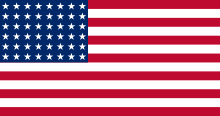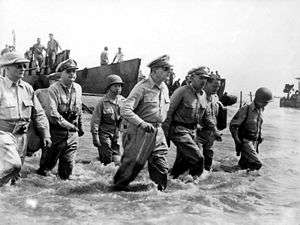1944 in the United States
| 1944 in the United States | |
|---|---|
| Years: | 1941 1942 1943 – 1944 – 1945 1946 1947 |
|
| |
 48 stars (1912–59) | |
|
Timeline of United States history
| |
Events from the year 1944 in the United States.
Incumbents
Federal Government
- President: Franklin D. Roosevelt (D-New York)
- Vice President: Henry A. Wallace (D-Iowa)
- Chief Justice: Harlan F. Stone (New York)
- Speaker of the House of Representatives: Sam Rayburn (D-Texas)
- Senate Majority Leader: Alben W. Barkley (D-Kentucky)
- Congress: 78th
Events
January
- January 20 – The U.S. Army 36th Infantry Division, in Italy, attempts to cross the Gari River.
- January 22 – World War II – Operation Shingle: the Allies begin the assault on Anzio, Italy. The U.S. Army 45th Infantry Division stands their ground at Anzio against violent assaults for 4 months.
- January 30 – World War II: United States troops invade Majuro, Marshall Islands.
- January 31 – World War II: American forces land on Kwajalein Atoll and other islands in the Japanese-held Marshall Islands.
February
- February 1 – World War II: United States troops land in the Marshall Islands.
- February 3 – World War II: United States troops capture the Marshall Islands.
- February 14 – SHAEF headquarters is established in Britain by General Dwight D. Eisenhower.
- February 17 – World War II: the Battle of Eniwetok Atoll begins; it ends in an American victory on February 22.
- February 20 – The United States takes Eniwetok Island.
- February 22 – United States Strategic Air Forces in Europe organized from the Eighth Air Force's strategic planning staff; subsuming strategic planning for all US Army Air Forces in Europe and Africa.
- February 29 – World War II – Battle of Los Negros and Operation Brewer: the Admiralty Islands are invaded by U.S. forces.
March
- March 1 – The USS Tarawa and USS Kearsarge are laid down.
- March 2 – The 16th Academy Awards ceremony is held.
- March 4 – In Ossining, New York, Louis Buchalter, the leader of 1930s crime syndicate Murder, Inc., is executed at Sing Sing, along with Emanuel "Mendy" Weiss, and Louis Capone.
April
- April 3 – Smith v. Allwright decided in the Supreme Court prohibits white primaries.
- April 25 – The United Negro College Fund is incorporated.
- April 28 – World War II: 749 American troops are killed in Exercise Tiger at Start Bay, Devon, England.
May
- May 24 – World War II: Six LSTs are accidentally destroyed and 163 men killed in Pearl Harbor's West Loch disaster.
- May 31 – World War II: Destroyer escort USS England (DE-635) sinks the sixth Japanese submarine in two weeks. This anti-submarine warfare performance remains unmatched through the twentieth century.
June

June 6: Normandy Landings
- June 4 – A hunter-killer group of the United States Navy captures the German submarine U-505, marking the first time a U.S. Navy vessel has captured an enemy vessel at sea since the 19th century.
- June 5 – US and British paratrooper divisions jump over Normandy, in preparation for D-Day. All including 82nd and 101st Airborne divisions of the United States.
- June 6 – World War II – Battle of Normandy: Operation Overlord, commonly known as D-Day, commences with the landing of 155,000 Allied troops on the beaches of Normandy in France. The Allied soldiers quickly break through the Atlantic Wall and push inland, in the largest amphibious military operation in history. This operation helps liberate France from Germany, and also weakens the Nazi hold on Europe.
- June 15
- Battle of Saipan: the United States invades Saipan.
- American forces push back the Germans in Saint-Lô, capturing the city.
- June 26 – World War II: American troops enter Cherbourg.
July
- July 1 – The United Nations Monetary and Financial Conference begins at Bretton Woods, New Hampshire.
- July 6
- Hartford Circus Fire: More than 100 children die in one of the worst fire disasters in the history of the United States.
- World War II: At Camp Hood, Texas, future baseball star and 1st Lt. Jackie Robinson is arrested and later court-martialed for refusing to move to the back of a segregated U.S. Army bus. He is eventually acquitted.
- July 17 – The S.S. E.A. Bryan, loaded with ammunition, explodes at the Port Chicago naval base; 320 are killed.
- July 21 – Battle of Guam: American troops land on Guam (the battle ends August 10).
August
- August 7 – IBM dedicates the first program-controlled calculator, the Automatic Sequence Controlled Calculator (known best as the Harvard Mark I).
- August 9 – The United States Forest Service and the Wartime Advertising Council release posters featuring Smokey Bear for the first time.
- August 15 – World War II: Operation Dragoon lands Allies in southern France. The U.S. Army 45th Infantry Division participates in its fourth assault landing at St. Maxime, spearheading the drive for the Belfort Gap.
- August 20 – World War II: American forces successfully defeat Nazi forces at Chambois, closing the Falaise Gap.
- August 22 – World War II: Tsushima Maru, a Japanese unmarked passenger/cargo ship, is sunk by torpedoes launched by the submarine USS Bowfin off Akuseki-jima, killing 1,484 civilians including 767 schoolchildren.
- August 31 – The Mad Gasser of Mattoon resumes his mysterious attacks in Mattoon, Illinois.
September

September 17–25: Operation Market Garden
- September 17 – World War II: Operation Market Garden begins.
- September 24 – World War II: the U.S. Army 45th Infantry Division takes the strongly defended city of Epinal before crossing the Moselle River and entering the western foothills of the Vosges.
- September 25 – World War II: Operation Market Garden ends in an Allied withdrawal.
October

October 20: Douglas MacArthur returns to the Philippines
- October 8 – The Adventures of Ozzie and Harriet radio show debuts in the United States.
- October 20
- United States and Filipino troops with Filipino guerillas begin the Battle of Leyte.
- The combined American and Filipino soldiers was liberated in Tacloban, Leyte was fought the Japanese Imperial forces.
- American forces land on the beaches in Dulag, Leyte, the Philippines, accompanied by Filipino troops entering the town, and fiercely opposed by the Japanese occupation forces.
- American forces land in Red Beach in Palo, Leyte as General Douglas MacArthur returns to the Philippines with Philippine Commonwealth president Sergio Osmeña, and Armed Forces of the Philippines Generals Basilio J. Valdes and Carlos P. Romulo.
- The LNG explosion destroys a square mile (2.6 km²) of Cleveland, Ohio.
- October 21 – World War II: Aachen,the first German city to fall, is captured by American troops.
- October 30 – Appalachian Spring, a ballet by Martha Graham with music by Aaron Copland, debuts at the Library of Congress in Washington, D.C., with Graham in the lead role.
November
- November 6 – Hanford Site in Washington (state) produces its first plutonium.
- November 7
- U.S. presidential election, 1944: Franklin D. Roosevelt wins reelection over Republican challenger Thomas E. Dewey, becoming the only U.S. president elected to a fourth term.
- A passenger train derails in Aguadilla, Puerto Rico, due to excessive speed on a declining hill; 16 are killed, 50 injured.
December
- December 10 – Legendary Italian conductor Arturo Toscanini leads a concert performance of the first half of Beethoven's Fidelio (minus its spoken dialogue) on NBC Radio, starring Rose Bampton. He chooses this opera for its political message – a statement against tyranny and dictatorship. Conducting it in German, Toscanini intends it as a tribute to the German people who are being oppressed by Hitler. The second half is broadcast a week later. The performance is later released on LP and CD, the first of 7 operas that Toscanini conducts on radio.
- December 13 – Battle of Mindoro: United States, Australian and Philippine Commonwealth troops land in Mindoro Island, the Philippines.
- December 16 – General George C. Marshall becomes the first Five-Star General.
- December 22 – World War II: Brigadier General Anthony C. McAuliffe, commander of the U.S. forces defending Bastogne, refuses to accept demands for surrender by sending a one-word reply, "Nuts!", to the German command.
- December 26
- World War II: American troops repulse German forces at Bastogne.
- The Glass Menagerie by Tennessee Williams premieres in Chicago.
- December 30 – Edward Stettinius Jr. becomes the last United States Secretary of State of the Roosevelt administration, filling the seat left by Cordell Hull.
Ongoing
- World War II, U.S. involvement (1941–1945)
Births
- January 4
- Frank Alesia, actor and television director (d. 2011)
- Charlie Manuel, baseball player and manager
- January 19 – Dan Reeves, American football player and coach
- January 20 – Linda Moulton Howe, journalist and producer
- February 1 – Mike Enzi, United States Senator from Wyoming since 1997.
- March 1 – John Breaux, United States Senator from Louisiana from 1987 till 2005.
- March 31 – Angus King, United States Senator from Maine since 2013.
- May 9 – Laurence Owen, American figure skater (d. 1961)
- May 14 – George Lucas, filmmaker and entrepreneur
- May 24 – David Mark Berger, American-born Israeli weightlifter, murdered in the Munich Olympics massacre (d. 1972)
- May 27 – Chris Dodd, United States Senator from Connecticut from 1981 till 2011.
- July 21 – Paul Wellstone, United States Senator from Minnesota from 1991 till 2002. (died 2002)
- November 21 – Dick Durbin, United States Senator from Illinois since 1997.
- December 28 – Johnny Isakson, United States Senator from Georgia since 2005.
Deaths
- January 7 – Lou Henry Hoover, wife of Herbert Hoover, First Lady of the United States (born 1874)
- March 7 – August Busck, entomologist and author of works on microlepidoptera (born 1870 in Denmark)
- November 9 – Frank Marshall, chess player (born 1877)
See also
External links
-
 Media related to 1944 in the United States at Wikimedia Commons
Media related to 1944 in the United States at Wikimedia Commons
This article is issued from Wikipedia - version of the 11/17/2016. The text is available under the Creative Commons Attribution/Share Alike but additional terms may apply for the media files.